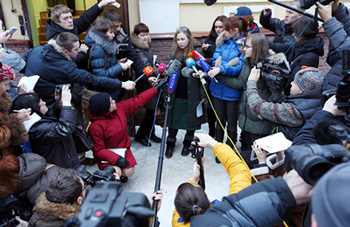

Vol. 78/No. 1 January 6, 2014

|
| Corbis/Demotix/Ben Weller |
| Pussy Riot members Maria Alyokhina, above, and Nadezhda Tolokonnikova won release from prison Dec. 23. “We didn’t ask for any pardon,” Alyokhina said in statement outside prison. “I would have sat here until the end of my sentence because I don’t need mercy from Putin.” |
Tolokonnikova and Alyokhina were released three months before their two-year sentences were up, as part of a public amnesty campaign by the Putin government for “invalids, veterans, minors, pregnant women, and women with young children.” At the last minute the original bill approved by Parliament was amended to allow amnesty for those convicted of “hooliganism.”
Tolokonnikova emerged from a prison near Krasnoyarsk, central Siberia, shouting “Russia without Putin!” She told Russia’s TV Rain that the two planned to help put together a human rights organization to fight for prisoners.
“I saw this little totalitarian machine,” she said of her time in prison, “what it is like from inside. Russia is really built on the model of the [penal] colony. Therefore it is so important to change the colony now, so as to change Russia along with the colony. The colony and the prison are 2 face of the country.”
Putin, a former agent of the KGB and head of its successor secret police agency in Russia after the Soviet Union disintegrated, has led the consolidation of a government in Russia based on a rising layer of capitalists with close ties to the state and its lucrative enterprises.
The amnesty follows a series of gains by Moscow in foreign relations relative to Washington and its imperialist allies. Putin secured an agreement with Washington on Syrian chemical weapons that has helped shore up the Moscow-allied regime of Bashar al-Assad. Using a combination of threats and substantial economic incentives, Moscow prevented the Ukrainian government from taking a step toward close economic and political ties with the European Union. And Putin has wielded embarrassing security leaks against Washington, gained through asylum provided to former National Security Agency contractor Edward Snowden.
The release of Pussy Riot members and other prisoners also takes place ahead of the Winter Olympics, scheduled for February in Sochi, Russia. “I think this is an attempt to improve the image of the current government, a little, before the Sochi Olympics — particularly for the Western Europeans,” Alyokhina told the New York Times Dec. 23.
And the deal also comes shortly after the Russian Supreme Court ordered a review of the convictions of Tolokonnikova and Alyokhina, holding the lower court had not proved they were motivated by hatred and ignored the fact that neither had previous convictions and are both mothers of young children.
One human rights group in Russia reported that the amnesty order would cover fewer than 1,500 of the country’s 564,000 prisoners, Reuters reported. Another 114,000 are in pretrial detention.
“We didn’t ask for any pardon,” Alyokhina told the Times outside the prison in Nizhny Novgorod where she had been held. “I would have sat here until the end of my sentence because I don’t need mercy from Putin.”
Both carried out hunger strikes while in prison to protest abusive treatment.
“My brigade in the sewing shop works 16 to 17 hours a day,” Tolokonnikova wrote in a five-page open letter in September about the penal colony in Mordova, Russia. “At best we get four hours of sleep a night. We have a day off once every month and a half.”
“I demand that we be treated like human beings,” Tolokonnikova said. She was hospitalized as a result of the hunger strike and soon afterwards transferred to a prison in Siberia.
A third Pussy Riot member, Yekaterina Samutsevich, who was convicted with them, was released in October 2012 on appeal because she had never entered the cathedral.
On Dec. 20, bourgeois opposition figure Mikhail Khodorkovsky was pardoned by Putin after 10 years in prison. Khodorkovsky, like other new big capitalists in Russia, used his position in the Soviet bureaucracy to amass a fortune through personal expropriation of state property. But he sought to challenge rather than work with the Putin government. After his release Khodorkovsky immediately left for Germany, telling the press he had enough money stashed overseas to never need to work and planned to no longer engage in business or politics in Russia.
Related articles:
Tortured, framed up, Chicago man freed after 31 years in jail
Chicago cop hit with manslaughter charge for killing Rekia Boyd, 22
Greetings to workers behind bars
‘Release all those tortured by Chicago cops’
Front page (for this issue) |
Home |
Text-version home